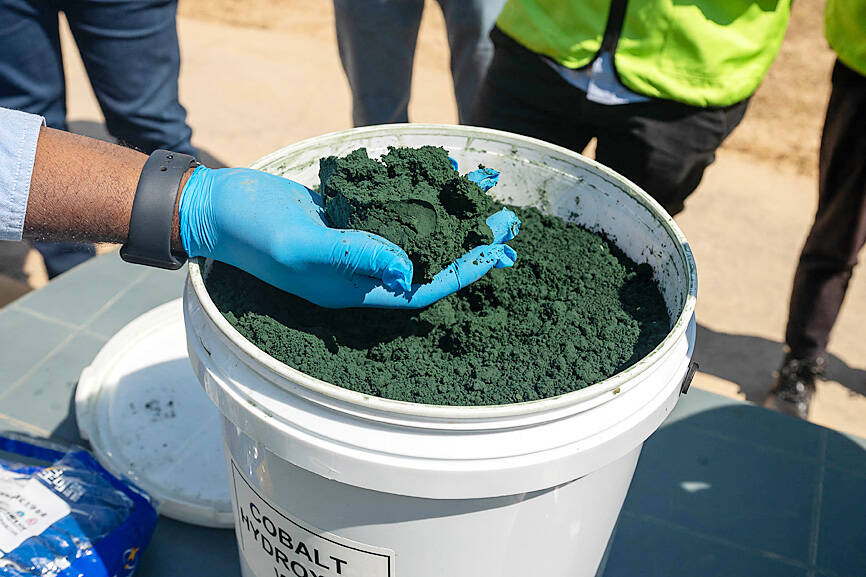China is taking advantage of tumbling cobalt prices to build up its inventories of the metal used in electric-vehicle batteries and aerospace alloys.
The Chinese National Food and Strategic Reserves Administration, the government stockpiling body, has agreed to purchase about 5,000 tonnes of cobalt from three local refiners and a state-owned trader this week, people familiar with the matter said.
The volume is higher than the original plan to buy 2,000 tonnes, after additional offers from the suppliers prompted the state stockpiler to take more grades of the metal, said the people, who asked not to be identified because they’re not authorized to speak publicly.

Photo: AFP
The National Food and Strategic Reserves Administration did not reply to a faxed request for comment.
Global cobalt prices have tumbled more than 60 percent from May last year on rising output from the Democratic Republic of the Congo (DRC) and Indonesia.
There could be a global surplus of 30,000 tonnes of the metal this year, which might widen further next year, Rystad Energy said.
Chinese refiners, which dominate processing of cobalt, are heavily reliant on material that comes from DRC mines, although Indonesia is quickly emerging as an important source.
Surging violence in the eastern DRC could further destabilize the country as it prepares for elections in December, a group of experts from the UN warned last month.
On the demand side, the adoption of cheaper cobalt-free lithium iron phosphate batteries, has gathered momentum. Ethical concerns about cobalt production from DRC have also fueled the shift away from cobalt in cathode chemistry.
However, cobalt is still crucial in diverse applications from aerospace materials to magnets.
The last time China stocked up on cobalt was in 2020 when it bought 2,000 tonnes of the metal for its strategic commodity reserves, to counter supply disruptions in DRC due to COVID-19.

Hon Hai Precision Industry Co (鴻海精密) yesterday said that its research institute has launched its first advanced artificial intelligence (AI) large language model (LLM) using traditional Chinese, with technology assistance from Nvidia Corp. Hon Hai, also known as Foxconn Technology Group (富士康科技集團), said the LLM, FoxBrain, is expected to improve its data analysis capabilities for smart manufacturing, and electric vehicle and smart city development. An LLM is a type of AI trained on vast amounts of text data and uses deep learning techniques, particularly neural networks, to process and generate language. They are essential for building and improving AI-powered servers. Nvidia provided assistance

STILL HOPEFUL: Delayed payment of NT$5.35 billion from an Indian server client sent its earnings plunging last year, but the firm expects a gradual pickup ahead Asustek Computer Inc (華碩), the world’s No. 5 PC vendor, yesterday reported an 87 percent slump in net profit for last year, dragged by a massive overdue payment from an Indian cloud service provider. The Indian customer has delayed payment totaling NT$5.35 billion (US$162.7 million), Asustek chief financial officer Nick Wu (吳長榮) told an online earnings conference. Asustek shipped servers to India between April and June last year. The customer told Asustek that it is launching multiple fundraising projects and expected to repay the debt in the short term, Wu said. The Indian customer accounted for less than 10 percent to Asustek’s

‘DECENT RESULTS’: The company said it is confident thanks to an improving world economy and uptakes in new wireless and AI technologies, despite US uncertainty Pegatron Corp (和碩) yesterday said it plans to build a new server manufacturing factory in the US this year to address US President Donald Trump’s new tariff policy. That would be the second server production base for Pegatron in addition to the existing facilities in Taoyuan, the iPhone assembler said. Servers are one of the new businesses Pegatron has explored in recent years to develop a more balanced product lineup. “We aim to provide our services from a location in the vicinity of our customers,” Pegatron president and chief executive officer Gary Cheng (鄭光治) told an online earnings conference yesterday. “We

LEAK SOURCE? There would be concern over the possibility of tech leaks if TSMC were to form a joint venture to operate Intel’s factories, an analyst said Taiwan Semiconductor Manufacturing Co (TSMC, 台積電) yesterday stayed mum after a report said that the chipmaker has pitched chip designers Nvidia Corp, Advanced Micro Devices Inc and Broadcom Inc about taking a stake in a joint venture to operate Intel Corp’s factories. Industry sources told the Central News Agency (CNA) that the possibility of TSMC proposing to operate Intel’s wafer fabs is low, as the Taiwanese chipmaker has always focused on its core business. There is also concern over possible technology leaks if TSMC were to form a joint venture to operate Intel’s factories, Concord Securities Co (康和證券) analyst Kerry Huang (黃志祺)